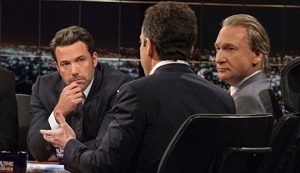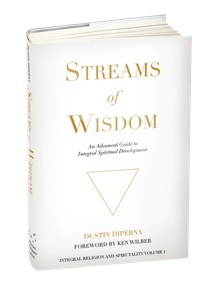TRANSLATE THIS ARTICLE
Integral World: Exploring Theories of Everything
An independent forum for a critical discussion of the integral philosophy of Ken Wilber
 Dustin DiPerna is founder of Bright Alliance ( www.brightalliance.org) and Co-Founder of Synergy Forum ( synergyforum.org). He is an entrepreneur, thought leader, group facilitator, and meditation instructor. For the past decade he has been a student of Integral Theory and has practiced in the spiritual lineages of Mahamudra and Dzogchen.
Dustin received a Bachelor of Science degree from Cornell University and a Master of Liberal Arts degree in Religion from Harvard University. His released his first two books, The Coming Waves and Streams of Wisdom, earlier this year. He lives in California with his wife, Amanda, and daughter, Jaya.
Bridging the Chasm
Sam Harris, Ben Affleck, and
a Needed Dose of Integral Theory
Dustin DiPerna
There was recently an exchange between Ben Affleck and Sam Harris... A classic example of two perspectives speaking past each other, each with partial truths.
There was recently an exchange between Ben Affleck and Sam Harris on Bill Maher’s Real Time television show that has stirred up a lot of dust. The passion revolved around some of the comments that Harris made about the religion of Islam and Affleck rising to Islam’s defense. A classic example of two perspectives speaking past each other, each with partial truths. I didn’t see the episode live but in the days after the exchange several people brought the interaction to my attention.
I’ve had an interesting relationship with Harris’ work ever since his book End of Faith was published. I welcome his rational voice but am often dismayed with how easily he dismisses religion altogether. I find his open mindedness about meditation and awareness training to be refreshing, yet his over identification with an anti-religion worldview often limits what he can see. (Coincidently, according to Amazon.com my recently released book Streams of Wisdom and Harris new book Waking Up are frequently bought together.)
As I read through Sam Harris’recent blog post ["Can Liberalism Be Saved From Itself?"], describing his experience with Affleck while on Maher’s show, I realized how much the entire field could benefit from a touch a of integral clarification. It is in that vein that I offer a bit of my own expertise on Integral Theory and Religion into the public sphere.
Islam is more than extremist and moderates
There is not one version of Islam that is either “Good” or “Bad” but there are at least five versions of Islam.
Islam, like all of our world’s great religious traditions, is enacted according to the specific levels of development of the actors involved. To be sure, Islam has a particular shape and flavor that has consistency throughout all interpretations. Folks like Harris tend to emphasize the consistent dimensions of faith, often intentionally highlighting the aspects that many consider the most challenging to stomach, as a methodology to provoke or even dismiss entire traditions as “bad ideas”. But just as each tradition has a flavor and shape itself, it is equally true that every human being has a lens and worldview that brings forth particular elements of the tradition according to the world that he or she can see. There is not one version of Islam that is either “Good” or “Bad” but there are at least five versions of Islam, all dependent upon specific levels of interpretation. Each of these levels is not arbitrary. The levels are consistent across traditions and can be correlated with very specific stages of psychological development.
 Ben Affleck, Sam Harris and Bill Maher
Ben Affleck, Sam Harris and Bill Maher
Whether we use the work of Harvard researcher James Fowler’s Stages of Faith or the early models of developmental progression found in the works of Jean Gebser, we see a very similar metric that can be used to explore five basic levels of development. These levels can be referred to using the shorthand terms:
- magic (Stage 1)
- mythic (Stage 2)
- rational (Stage 3)
- pluralistic (Stage 4)
- integral (Stage 5)
Each level has particular characteristics and hallmarks of how it shows up in the world. Furthermore, each level has both moderate and extremist orientations.
- At a magic level of engagement, or in the context of this outline, what we might call a Magic interpretation of Islam, is hallmarked by superstition, an outlook that seldom takes perspectives outside of basic egocentric concerns, and an obsession or overemphasis on ritual and/or on specific lines of text without a broader comprehension of the larger context.
- Mythic versions of religious traditions, and in this case, mythic version of Islam, tend to be deeply ethnocentric. This means that there is a very strong emphasis on “in group and out group”/ “people of the book and infidels”, etc.. Also at this stage there is often an over dependence on black and white meaning making. Absolutistic stances are taken on topics, almost always based on external authority, without much room for rational inquiry.
- Rational orientations to religion, or Rational expressions of Islam, begin to open to honest and rational inquiry. There is a deep analysis of all those beliefs that one once held without question and a tendency to now make a self determination. Healthy expressions of this stage may move into agnostic or even atheistic orientations for periods of time. If one decides to stay engage with his or her religious tradition, any new beliefs can’t come from external authority but rather have to be based on one’s own tried and true experience.
- Pluralistic interpretations of faith, or Pluralistic Islam, begin to expand the lens and perspective to include the orientation of other religious systems. As cultural exposure deepens there is a sense that one’s own religious system can be filled out by the perspectives of others. Pluralistic Islam seeks to understand the “other” through dialogue, learning, and exchange.
- Finally, Integral orientations (as with all later stages) sees the entire spectrum of growth and development. In doing so, this stage of religious orientation seeks to build bridges connecting various levels of interpretation. Understanding that everyone starts the developmental process at stage 1, this level sees the importance of building conveyor belts of potential growth and development in each tradition. Rather than merely sitting in a circle in dialogue (as the Pluralistic level might do) the integral stage combines discernment and compassion acknowledging that some views are broader, more compassionate and more inclusive than others.
What’s the real issue?
The issue is that most of our world’s religious traditions were founded at a mythic level of development.
The issue is that most of our world’s religious traditions were founded at a mythic level of development. Accordingly, the vast amount of people that subscribe to organized religion still fall within this ethnocentric stage of interpretation. Let’s take a look at Islam in particular. As Western (rational level) values—often dependent upon an unquestioned commitment to scientific materialism—continue to encroach on the traditional Muslim world, there is a massive tendency for mythic Islam to dig in its heals preventing any sort of vertical movement into more rational orienations. In some cases, like those we see with the spread and politicization of Wahhabism, mythic Islam turns reactionary and moves into its more extreme versions.
The point to all of this is that in the discourse between Affleck and Harris it’s not just a case of understanding the difference between extremist and moderates, “Good Muslims” vs. “Bad Muslims”. That binary outlook no longer serves us. Rather, what is needed is the critical comprehension that individuals, with different levels of development, are enacting Islam (and all other religious traditions) according to their own worldviews and levels of development. And even more importantly, we must come to the understanding that there are paths that can be highlighted that can help individuals move along that developmental spectrum from magic, to mythic, to rational, to pluralistic, to integral versions of each tradition. As development unfolds, interpretations of faith move from being more restrictive, ego-centric and ethno-centric in view to orientations that more compassionate, open, and world-centric.
Harris should be allowed to use his discernment to criticize certain aspects of Islam without Affleck jumping on him as if he is a bigot. But to be effective, at least from an integral perspective, Harris needs to offer that criticism with an understanding of various levels of developmental interpretation. If offered in this way, any criticism would come more in the form of encouragement for deeper development and growth for the individuals rather than with an ode of divisiveness and a desire for eradication.
What now?
Holding all of this in light, the task in front of all of us who can see a whole and integral world, is to develop conveyor belts within each of the traditions. This will require working directly with Imams, Rabbis, Priests, Lamas and Swamis to acknowledge the entire spectrum of developmental interpretation. As these conveyor belts are made known around the world and in each spiritual lineage, we provide pathways for individuals and communities everywhere to stay within their spiritual tradition while finding a marriage with their own rational orientations (and beyond).
There is a bridge of hope expanding across the chasm of the religious and the rational. Many of us have already taken it. Integral Theory provides one lens and one possibility to make the journey a little easier for us all.
FURTHER READING
Dustin DiPerna, (2007), "The Muslim Ladder", www.integralworld.net. Een early essay by Dustin, a chapter from the book-in-progress The Infinite Ladder, wich contains many illustrative examples of magical, mythic, rational, pluralistic and integral forms of islam. It will be included in his next publicationEvolution's Ally (expected early 2015).
Dustin DiPerna, (2014), Streams of Wisdom: An Advanced Guide to Integral Spiritual Development, Integral Religion and Spirituality Series vol 1, Integral Publishing House.
Dustin DiPerna & H.B. Augustine (eds.), (2014), The Coming Waves: Evolution, Transformation and Action in an Integral Age, Integral Publishing House.
Dustin DiPerna, (2015), Evolution's Ally: Our World's Great Religious Traditions as Conveyor Belts of Transformation, Integral Religion and Spirituality Series vol 2, Integral Publishing House.
|
 Dustin DiPerna is founder of Bright Alliance (www.brightalliance.org) and Co-Founder of Synergy Forum (synergyforum.org). He is an entrepreneur, thought leader, group facilitator, and meditation instructor. For the past decade he has been a student of Integral Theory and has practiced in the spiritual lineages of Mahamudra and Dzogchen.
Dustin received a Bachelor of Science degree from Cornell University and a Master of Liberal Arts degree in Religion from Harvard University. His released his first two books, The Coming Waves and Streams of Wisdom, earlier this year. He lives in California with his wife, Amanda, and daughter, Jaya.
Dustin DiPerna is founder of Bright Alliance (www.brightalliance.org) and Co-Founder of Synergy Forum (synergyforum.org). He is an entrepreneur, thought leader, group facilitator, and meditation instructor. For the past decade he has been a student of Integral Theory and has practiced in the spiritual lineages of Mahamudra and Dzogchen.
Dustin received a Bachelor of Science degree from Cornell University and a Master of Liberal Arts degree in Religion from Harvard University. His released his first two books, The Coming Waves and Streams of Wisdom, earlier this year. He lives in California with his wife, Amanda, and daughter, Jaya.

